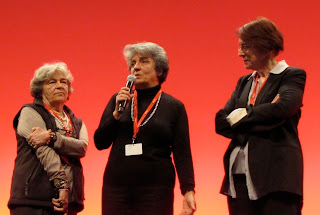Interview with Maria Schneider (re-broadcast from March 2001).
By Moira Sullivan Interview A Transcript Maria Schneider Interview By Moira Sullivan ©Moira Sullivan 2001 Maria Schneider was the Guest of Honor at the Créteil Films de Femmes International Women's Film Festival, March 23-April 2, 2001 and honored with a retrospective of her work. Schneider was the star of the riveting Last Tango in Paris (Italy, 1972), a film New York film critic Pauline Kael loved and defended and whose 6,000 word review was used as an ad to promote the film. In Italy director Bernardo Bertolucci and actors Maria Schneider and Marlon Brando were brought to court for making an 'indecent' film. The charges were later dropped. In several cities in the US, the film was banned. Schneider's career after that was always equated with this cardinal work. She starred in over 40 films and is presented here in a personal interview at the Créteil festival. Q: Maria you were the 'cause celebre' of the '70s art house films and work...


